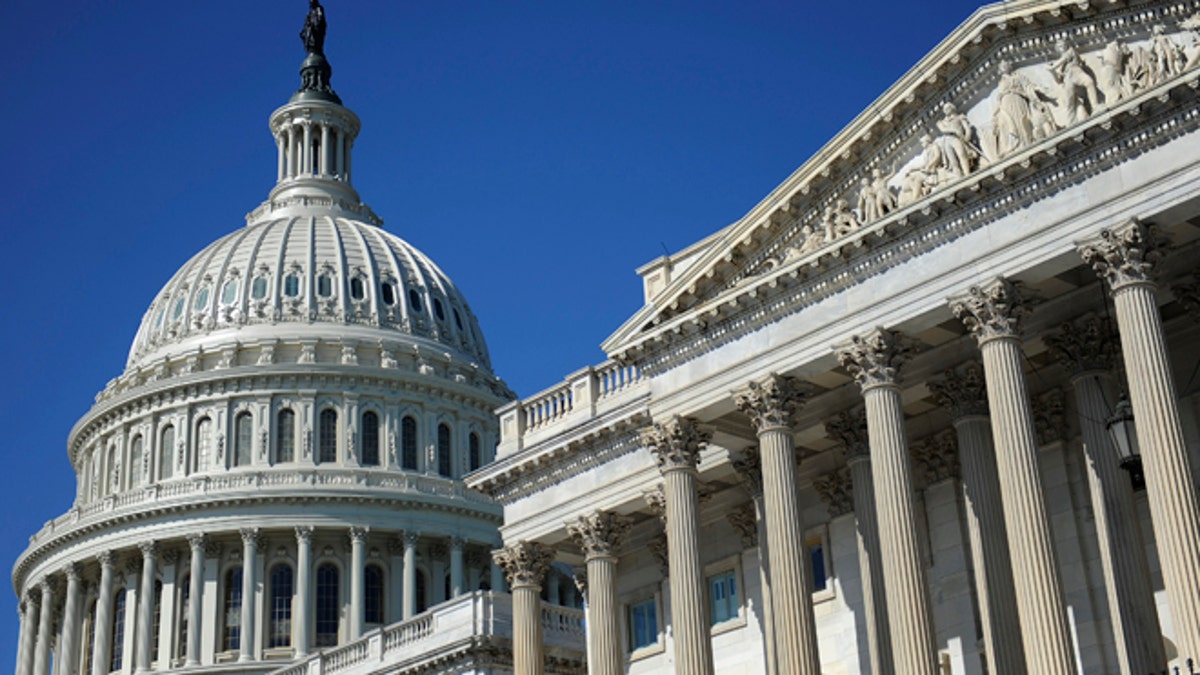
The U.S. Capitol dome and U.S. Senate (R) in Washington, August 2, 2011. The United States is poised to step back from the brink of economic disaster on Tuesday when a bitterly fought deal to cut the budget deficit is expected to clear its final hurdles in the U.S. Senate. REUTERS/Jonathan Ernst (UNITED STATES - Tags: POLITICS BUSINESS) (Reuters)
With the non-stop posturing in Washington over the looming fiscal crisis, it's easy to lose sight of what's at stake.
Simply put, D.C. economists say that failing to avert the double-whammy of tax hikes and spending cuts could send the country back into recession. The impact is so devastating because so many areas of the budget and tax policy are affected.
The following is a breakdown of what happens next month if lawmakers fail to reach a deal -- as well as the Democratic and Republican proposals.
Bush-era tax rates
- Without a deal, these tax rates will rise for everybody on Jan. 1. That means a $2,000-a-year hit for a middle-income household, but the rate for every income tax bracket would rise. Taxes would also go up on investment income like capital gains, with that rate rising from 15 percent to 20 percent for most earners. Dividends would be taxed like regular income, as opposed to a flat rate of 15 percent.
- Under the Obama administration alternative plan, the current tax rates would stand for all but the top 2 percent of earners. For households making over $250,000, though, rates would rise, with the top rate going from 35 percent to 39.6 percent. The plan would also raise capital gains and dividends rates -- all told, the administration is looking to raise $960 billion over 10 years this way.
- Under the House Republicans' plan, the current tax rates would be preserved for everybody. However, Republicans propose raising $800 billion over 10 years by limiting deductions for top earners and other tax reform measures.
Payroll tax cut
- Without a deal, the Social Security tax rate will rise on Jan. 1 from 4.2 percent to 6.2 percent.
- The Obama administration plan calls for extending this tax holiday once again, or finding an alternative policy.
- The Republican plan does not mention the payroll tax holiday
Unemployment aid
- Without a deal, jobless benefits for the long-term unemployed will end on Jan. 1. The maximum 73 weeks in state and federal benefits will fall to 26 weeks.
- The Obama administration plan calls for extending this aid again.
- The Republican plan does not mention it.
Budget cuts
- Without a deal, the first round of automatic spending cuts will hit starting Jan. 2. In the first year, this includes roughly $55 billion from defense spending and $55 billion from domestic programs.
- The Obama administration plan calls for deferring these cuts for a year, while seeking $400 billion in entitlement cuts.
- The Republican plan does not specify how it would treat the so-called "sequester," but appears to offer as an alternative roughly $900 billion in cuts to entitlements over the next decade, and $300 billion in other discretionary budget cuts.
Medicare "doc fix"
- Without a deal, Medicare rates paid to physicians will fall nearly 30 percent starting Jan. 1.
ObamaCare tax hikes
- Regardless of whether a deal is struck, a 3.8 percent surtax is still expected to be imposed on Jan. 1 on investment income for top earners, as part of the federal health care overhaul. Further, Medicare Part A taxes will increase from 1.45 percent to 2.35 percent for households making over $250,000.












































